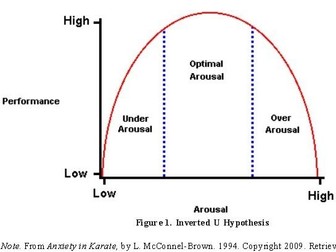sports psychology
- Created by: luluirmiger
- Created on: 30-10-18 14:39
CLASSIFICATION OF SKILLS
Skill- a learned action or behaviour. once learned it can be performed easily and efficiently again with a very similar outcome.
Ability- an inherited, stabe trait that determines an individuals potential to learn a skill.
Basic____________________________________________________Complex (simple, not a lot of concentration) (requires a lot of concentration + coordination)
Open__________________________________________Closed (affected by the environmnt) (not affected by the environment)
Self paced____________________________________Externally paced
(performer contros how it starts) (started by an external factor)
Gross movement_____________________________________Fine movement
(uses large muscle groups) (involves small groups of muscles)
GOALS AND TARGETS
Performance goals: personal standards to be achieved. Comparing themselves against their own previous achievements.
Outcome goals: goals that focus on the end result, on winning.
SMART targets- To ensure that goals are appropriate, increase motivation and reduce anxiety.
Specific to the demands of the sport, muscles and movements used.
Measurable.
Accepted by the performer and others involved in training and competition.
Realistic/ possible to complete and attain.
Time-bound: it must cover a set period of time so it is clear whether it has been acieved or not.
INFORMATION PROCESSING
1) Input:
your senses tell you what's happening
2) Decision making:
your brain decides what to do
3) Output:
your body carries out the action
4) Feedback:
you find out if you've been successful. Types of feedback= Intrinsic- info performer recieves from within, kinaesthetic- (a kind of intrinsic) recieved by receptors in the muscles, extrinsic- recieved outside themselves such as froma coach.
GUIDANCE AND FEEDBACK ON PERFORMANCE
Guidance: a method of conveying info to a performer.
- Visual- in a form that the performer can see it. e.g) a demonstration, video clip or photos
- Verbal- involves using the sense of hearing. e.g) listeining to someone givng instructions
- Manual- where a performer could be assisted in physical movement e.g) support doing a gymnastic vault
- Mechanical- involves using objects or aids e.g) RoboGolfPro
Feedback: info a performer recieves about their performance.
- Positive/negative- telling the performer what was good and bad about their performance
- Knowledge of results- the feedback through the end results of their performance
- Knowledge of performance- how the performer feels about their performance
- Extrinsic/intrinsic feedback- either from themselves (intrinsic) or from others (extrinsic)
AROUSAL
Arousal: a physical and mental state of alertness or readiness, varying from deep sleep to intense excitement or aletrness.
Stress management:
- Deep breathing - return breathing to normal and increase oxygen supply to brain
- Mental rehearsal, vissualisation and imagery - controlling thoughts and imagining positive outcomes
- Positive self talk - mentally reflecting and reframing thoughts, replacing negative thoughts with positive ones.
THE INVERTED U THEORY

AGGRESSION, PERSONALITY TYPES AND MOTIVATION
Aggression: a deliberate intent to physically or mentally harm or injure another person.
- Direct aggression - aimed directly at another player/performer involving physical contact
- Indirect aggression - does not involve physical contact with another person, but with an object such as hitting a tennis ball harder.
Personality types:
- Introverts - shy, quiet, thoughtful individuals. Tend to play individual sports where concentrations and precision is required.
- Extroverts - sociable, enthusiastic individuals. Tend to play fast-paced team sports.
Motivation: the drive/desire to succeed.
- Intrinsic - the drive to succeed that comes form within
- Extrinsic - the drive to perform well or to win in order to gain external rewards
Related discussions on The Student Room
- Sport Science at University of Surrey »
- University course, I'm still undecided »
- Sport and Exercise Science BASES accreditation »
- Psychology conversion course (masters)UK »
- University help! »
- Answering Questions: What can a degree in Sports and Exercise Science lead to? »
- UEA, Loughborough, or Royal Holloway? »
- uni of loughborough »
- Work experience »
- Are there any marketing degrees which are not along side a management degree »
Comments
No comments have yet been made